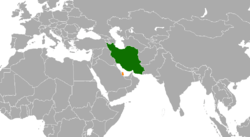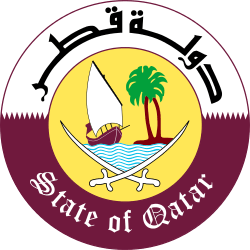Iran–Qatar relations
 |
|
Iran |
Qatar |
|---|---|
Iran–Qatar relations refer to the bilateral relations between the Islamic Republic of Iran and the State of Qatar. Iran has an embassy in Doha while Qatar has an embassy in Tehran. Relations between the two countries have been soured after Saudi Arabia severed ties with Iran following the January 2016 attack on the Saudi diplomatic missions in Iran.
Qatar and Iran have close ties. Both are members of OPEC, the Non-Aligned Movement, and the Organization of the Islamic Conference. Unlike fellow GCC member states Saudi Arabia and the United Arab Emirates, Qatar generally refrains from criticizing Iran’s domestic and foreign activities. Qatar has also held several high-level meetings with Iranian officials to discuss security and economic agreements.[1]
The two countries have a close economic relationship, particularly in the oil and gas industries. Iran and Qatar jointly control the world’s largest gas field.[2] In addition to ties in the oil and natural gas arena, Iran and Qatar also cooperate in the shipping sector.[1]
The Iranian community in Qatar, although large, is well integrated and has not posed a threat to the Iranian government. It accounts for some 30,000 people of the Iranian diaspora worldwide.
Bilateral relations
During Shah Mohammed Reza Pahlavi's regime in 1969, Iran and Qatar signed a demarcation agreement.[3]
Throughout the Iran–Iraq War (1980–1988), Qatar supported Saddam Hussein's Iraq financially by providing large loans and cash gifts. Iran's claim in May 1989 that one-third of Qatar's North Field gas reservoir lay under Iranian waters apparently was resolved by an agreement to exploit the field jointly.
Qatar has maintained cordial relations with Iran. In 1991, following the end of the Persian Gulf War, former emir of Qatar Hamad bin Khalifa welcomed Iranian participation in Persian Gulf security arrangements, however due to resistance from other Persian Gulf Arab States these never came into fruition. However, Qatar maintains security cooperation with Iran through bilateral ties. Additionally, plans were being formulated in 1992 to pipe water from the Karun River in Iran to Qatar, but after local resistance in Iran this was laid to rest.
In February 2010, during a Q&A session following U.S. Secretary of State Hillary Clinton’s speech at the US-Islamic World Forum in Doha, Prime Minister Sheikh Hamad bin Jassim bin Jaber Al Thani conceded that if Iran’s program spurs “a nuclear race in the region, it will be an unhealthy race for all.” Sheikh Jaber also advocated for “direct dialogue between Iran and the United States.”[4]
In May 2010, Emir of Qatar Sheikh Hamad bin Khalifa Al Thani and Syrian President Bashar al Assad expressed support for Turkish-led efforts to bring about a diplomatic resolution to the dispute over Iran’s nuclear program. Turkish officials proposed to mediate direct talks between Iran’s top nuclear negotiator Saeed Jalili and EU foreign policy chief Catherine Ashton.[5]
2016 attack on the Saudi diplomatic missions in Iran
Qatar has recently condemned the attacks and has decided to recall its ambassador from Tehran while the Qatari Foreign Affairs Ministry issuing a protest statement at the Iranian embassy in Doha saying that it constitutes a violation of the international charters and norms that emphasize the protection of diplomatic missions and their staff.[6]
References
- 1 2 Fulton, Will; Farrar-Wellman, Ariel (July 22, 2011). "Qatar-Iran Foreign Relations". AEI Iran Tracker. American Enterprise Institute. Retrieved November 2, 2016.
- ↑ "Factbox: Qatar, Iran share world's biggest gas field". Reuters. July 26, 2010. Retrieved November 2, 2016.
- ↑ Mokhtari, Fariborz (Spring 2005). "No One Will Scratch My Back: Iranian Security Perceptions in Historical Context" (PDF). The Middle East Journal. 59 (2). Retrieved 1 November 2016.
- ↑ "Remarks With Qatari Foreign Minister Sheikh Hamad bin Jassim Al Thani After Their Meeting". US Department of State. Retrieved 2 November 2016.
- ↑ "Turkey says Syria, Qatar back Iran plan". Agence France-Presse. Retrieved 2 November 2016.
- ↑ https://www.rt.com/news/328131-qatar-diplomatic-iran-saudi-arabia/

